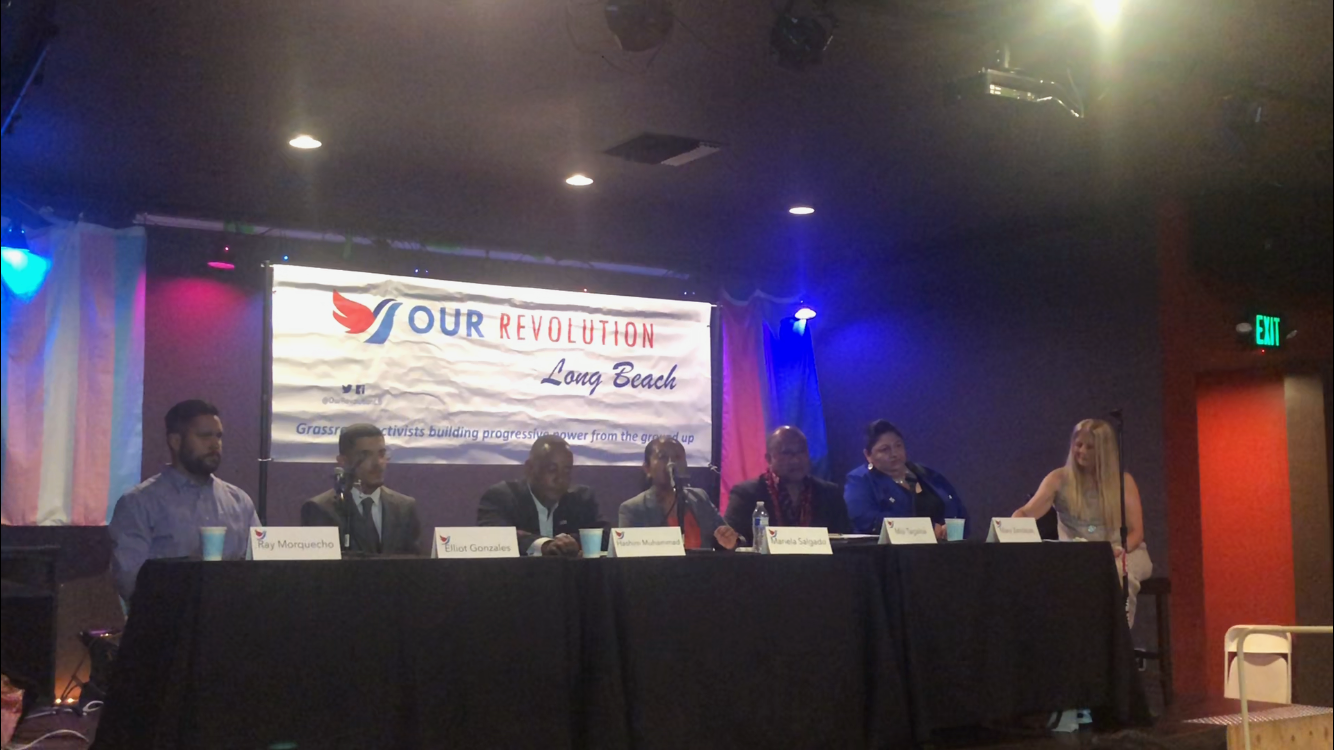First District Candidates Draw Contrasts at Forum
9 minute readOn Thursday, Our Revolution, a grassroots progressive organization, held a forum for candidates of Long Beach’s Council District 1. The packed event was at the Toxic Toast Records Theater in downtown.
The crop of candidates vying for the seat, like the district, is diverse, with folks from various backgrounds. It’s also a crowded field, with seven candidates on the official roll. Six participated on Thursday. Candidates Shelbyrae Black and Shirley Huling did not attend the forum. All of the candidates will appear on the ballot except Hashim Muhammad, who didn’t change his voter registration to reflect his residence in the district before the filing deadline and is running as a write-in candidate.
Turn out for District 1 elections has been low the last few cycles. The last election for District 1, back in 2014, saw only 12.5 percent of registered voters come out to the polls. Former District 1 Councilmember Lena Gonzalez, who vacated her seat to join the State Senate in June, won that year by a mere 590 votes, beating recurrent candidate Misi Tagaloa, who has jumped into the race once again. Without a run-off, whoever receives a plurality of votes will be catapulted onto the city council and with this many candidates, the Nov. 5 election could prove to be anyone’s game.
Here are some takeaways from the night compiled by the FORTHE staff.
Housing—but how?
When asked what their top three priorities would be if elected, all six candidates included addressing the housing crisis in some fashion, though their solutions varied.
Elliot Gonzales, a progressive activist, and Muhammad, a security contractor, advocated explicitly for rent control, while Tagaloa and Ray Morquecho said they didn’t think it was the answer.
“To have someone control your livelihood is almost anti-American,” said Tagaloa, a real estate broker and chief executive officer of Canopy Communications, a nonprofit which creates and rehabilitates affordable housing in Long Beach. He is also a pastor at the Second Samoan Congregational Church.
Mary Zendejas, a Long Beach Transit Director who has received the endorsement of Sen. Gonzalez and Mayor Robert Garcia, did not explicitly state her position on rent control, but instead mentioned that Long Beach already has 7,000 rent-stabilized units and, if elected, she would like to “expand on” them.
She also highlighted her recent struggle to find a wheelchair-accessible apartment to illustrate the need for more housing that can accommodate people with disabilities.
Mariela Salgado, a small business owner and Parks and Recreation Commissioner, said she would have supported a moratorium on rent increases while the city worked out its tenant relocation ordinance and also wants to see more resources for those seeking to buy a home.
In terms of building housing, Morquecho, also a small business owner, joined Muhammad in calling for an increase in development. Muhammad also called for more developer tax breaks to promote housing construction.
Gonzales countered by saying the city needs to create public housing through a land trust rather than simply incentivizing developers. A community land trust is a nonprofit entity that allows for land to be taken out of the market and used to benefit the neighborhood, which in Gonzlales’s plan would be the construction of affordable housing.
Two of the candidates, Tagaloa and Gonzales, said they believed housing to be a human right. Muhammad called gentrification a “violation of… human rights.”
Some go global, some stump on “stumps”
While some of the candidates tapped into national debates during the forum, others stuck to more localized talking points. This was most clearly reflected in the differences between Morquecho and Gonzales.
Gonzales brought a more global perspective to the issues facing Long Beach, casting the city as a potential leader in the fight against climate change. He stated his support for Vermont Senator and presidential hopeful Bernie Sanders and cited the Green New Deal, an aggressive plan introduced in Congress to decarbonize the country’s economy by the end of the next decade.
“We have an obligation, all of us, the people of the world, have an obligation to the next generation to make sure we leave this planet healthy and habitable,” said Gonzales.
Morquecho views the office differently.
“You have to start from the ground level,” said Morquecho. “[Councilmembers are] supposed to be dealing with little issues, tree trimming, stump removal, the alleyways.”
Local politics is about building trust and solving the day-to-day problems of residents, he said.
“You listen to everybody. Your job isn’t to exclude people or have an agenda.”
Wide support for immigrants and labor
Morquecho said that, while immigration is set on a national level, he supported “sanctuary” policies that bar local departments from assisting federal agents in enforcing immigration policy.
“That’s not what Long Beach PD is supposed to do,” said Morquecho.
Gonzales had a bit more fire, stating “we need to kick ICE (Immigration and Customs Enforcement) out of Long Beach,” referring to the ICE office in downtown.
Tagaloa referenced his experience as a pastor and said the city could do more to keep churches as safe spaces for immigrants seeking refuge. Salgado and Zendejas both mentioned their family’s immigrant past as a sign of solidarity with the struggles of immigrants today. Zendejas said she became a citizen of the United States at the age of 18. Salgado said she also came to the United States as an undocumented person, “a dreamer before there were dreamers,” and called for more language access on the city level.
Tomisin Oluwole
Dine with Me, 2022
Acrylic on canvas
36 x 24 inches
Click here to check out our interview with Tomisin Oluwole, a literary and visual artist based in Long Beach.

Instead of gunking up our site with ads, we use this space to display and promote the work of local artists.
All the candidates expressed their support for labor unions, however, Morquecho qualified his answer with “also support[ing] business” and called for compromise between labor and capital.
Zendejas showed enthusiastic support for unions and for local hire policies. This was echoed by Salgado who hopes to create more labor agreements that would guarantee large-scale projects would hire locally. Gonzales tied the issue of unions to a recent contract dispute between municipal workers and administrators, denouncing city management’s bargaining tactics and saying city employees needed to “beg and plead” for benefits. He also forecasted that the Port of Long Beach’s push toward automation would eliminate jobs.
Policing the police
While the stage was largely united on sanctuary city policies and support for unions, the question of police violence created some daylight between the candidates.
Zendejas danced around the issue, saying it was a “tough” question. In the end, she called for more sensitivity training and was supportive of the current body-worn camera program. Morquecho agreed with her that it was a “tough” subject to address.
Salgado proposed adding more diversity to the department to better reflect the communities it serves. She also mentioned going on a ride along with Long Beach police officers, which gave her newfound respect for law enforcement.
“But I do think there’s some additional things that we can do, like support or require training that’s de-escalation of conflict, provide training with youth development,” Salgado added.
Tagaloa said the police department needs more accountability, noted that the city pays millions of dollars in taxpayer money every year as a result of lawsuits stemming from police violence, and supports a review of police hiring practices.
Gonzales said that candidates who take campaign contributions from the police officers’ association find themselves in a conflict of interest when the issue of police misconduct is brought up.
“When you take police officer money, you have less courage to speak out when there’s something that goes wrong,” Gonzales said.
Selling out or buying in?
The candidates’ answers were all over the map on questions about campaign finance and whether donations to their campaigns would have the power to influence their decisions behind the dais.
Zendejas said she’s willing to take “money from everyone” but her vote could not be bought.
“I’ve always been an independent woman, and intend to stay being an independent woman,” Zendejas said.
She mentioned her recent campaign kick-off, a who’s who of the city’s business and political elite held at the chic new distillery Portugese Bend, but said she was unsure of how much money had been raised at the event.
“I just had a fundraiser, and I’m super excited about it. But I don’t know exactly how much we raised, but I’m hoping it’s enough at least to make sure that we have our paperwork in and stuff.”
For his part, Morquecho acknowledged that “money buys influence” in politics but that he plans on being up front about any donations from special interests.
“If [a voter has the] question, ‘Why did you take this money? Why did this happen?’ I’ll tell you,” he said.
Tagaloa pledged not take money from the oil industry. Gonzales committed to not accepting any corporate money, and Muhammad said he is not accepting any money at all, saying he plans on bankrolling his own campaign.
Salgado, who called herself the “community-based” candidate, plans on getting funding from “small business owners” and “community members.” She commented on independent expenditures, campaign committees which do not have any direct contact with the candidates they endorse, which may foreshadow her future criticisms against opponents.
“Endorsements [by groups making independent expenditures] are going to be the ones that you should look for, because they’re looking [out] for their own special interests, and not the interests of the community.”
What’s next?
The candidates will have three months to campaign before election day. No other candidate forums have been scheduled as of press time.
You can register to vote or check your registration status here.
If you’re not sure if you live in CD 1, you can find your address on the council map here.
If you have a personal perspective you’d like to share about the race for CD1, shoot an email to us at editors@forthe.org! And if you want to support our collective experiment in local media for the Long Beach community, we welcome donations of all shapes and sizes at our Patreon.


 editors@forthe.org
editors@forthe.org




